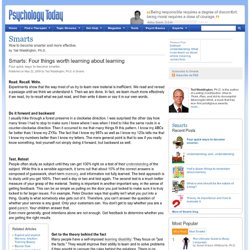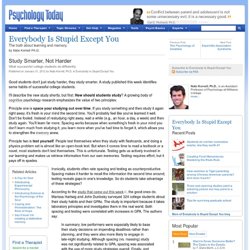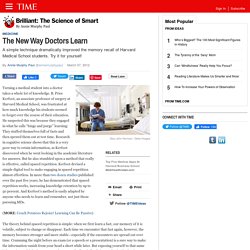

How to Learn a Language Part 2. Photo (C) 2012 Carl Beuke. Part 1 of this article explains how the language learning secrets of the man who invented one of the world’s best-selling language series have been hidden for years. Unveiled in this article is the second installment of the forgotten wisdom of the man who studied Russian with a martini in his hand. Where to start Dr Pimsleur suggests starting by learning a few things that will be immediately useful, rather than with lengthy and complex grammatical theory. He adds that if you struggle with concentration, you should break up your study into short bursts of around twenty minutes. Underlying Dr Pimsleur’s suggested approach are some of the same key principles that are explained in more recent books on how to learn effectively (e.g. Practice recalling the information Challenge yourself to answer questions. Get immediate feedback When you self-test your recall of information, check whether you have recalled it correctly.
Practice recall in many contexts. Top 10 List to Improve Your Child's Memory. How Memory Works. Smarts: Four things worth learning about learning. {*style:<b>Read.

Recall. Write. </b>*} Experiments show that the way most of us try to learn new material is inefficient. We read and reread a passage until we think we understand it. Then we are done. {*style:<b>Do it forward and backward </b>*}I usually hike through a forest preserve in a clockwise direction. {*style:<b>Test, Retest </b>*}People often study as subject until they can get 100% right on a test of their understanding of the subject.
Even more generally, good intentions alone are not enough. {*style:<b>Get to the theory behind the fact </b>*}Many people have a self-imposed learning disability : They focus on "just the facts. " Understanding the principle of compounding allows you to see that a very small change in the interest rate makes a huge difference over time and that when paying off a debt or saving money, a small change in the amount you add or subtract each month makes an enormous difference - pennies - in how quickly you reach your goal. Strange Tips For Studying That Actually Work (audio) Study Smarter, Not Harder. Good students don't just study harder, they study smarter.

A study published this week identifies some habits of successful college students. I'll describe the new study shortly, but first: How should students study ? A growing body of cognitive psychology research emphasizes the value of two principles: Principle one is space your studying out over time . If you study something and then study it again right away, it's fresh in your mind the second time.
Principle two is test yourself . Ironically, students often rate spacing and testing as counterproductive. According to the study that came out this week , the good ones do. In summary, low performers were especially likely to base their study decisions on impending deadlines rather than planning, and they were also more likely to engage in late-night studying. Why spacing wasn't significantly related to GPA isn't clear. It's always important to remember that correlation doesn't equal causation.
The New Way Doctors Learn. Turning a medical student into a doctor takes a whole lot of knowledge.

B. Price Kerfoot, an associate professor of surgery at Harvard Medical School, was frustrated at how much knowledge his students seemed to forget over the course of their education. He suspected this was because they engaged in what he calls “binge and purge” learning: They stuffed themselves full of facts and then spewed them out at test time. Research in cognitive science shows that this is a very poor way to retain information, as Kerfoot discovered when he went looking in the academic literature for answers. But he also stumbled upon a method that really is effective, called spaced repetition. (MORE: Couch Potatoes Rejoice!